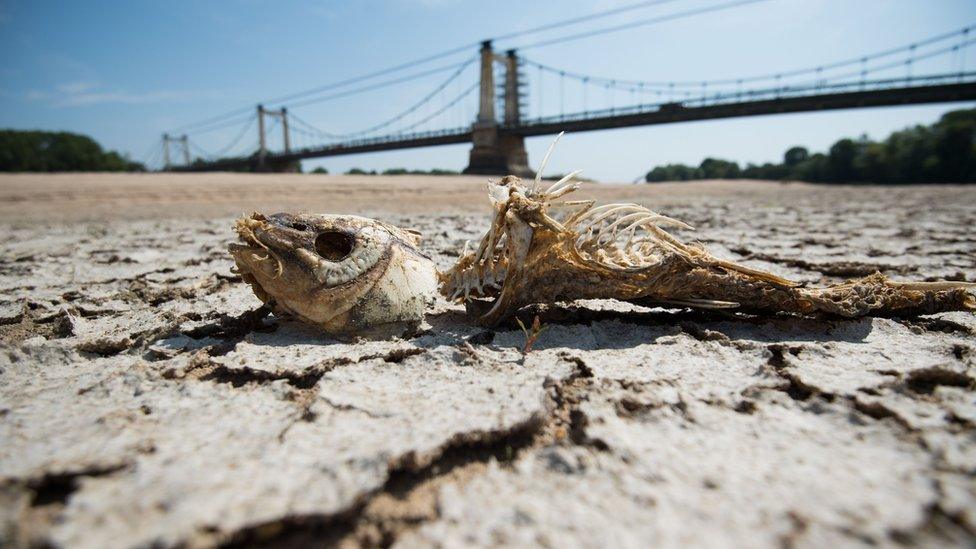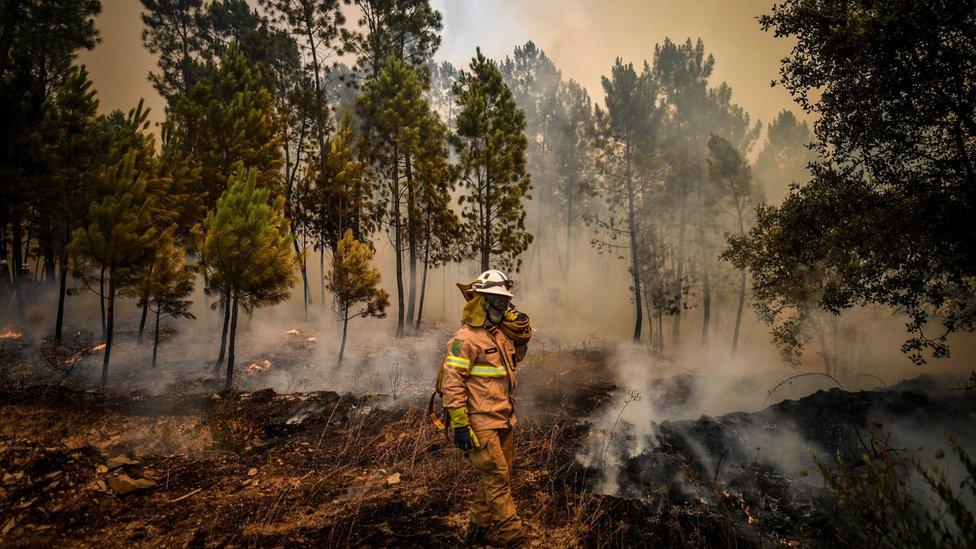Climate change: Heatwave made up to 3C hotter by warming
- Published
- comments

The searing July heatwave that hit Europe last week was made both more likely and more intense by human-induced climate change, scientists say.
A rapid attribution study, external says that heating added up to 3C to the intensity of the event that scorched the UK, France and the Netherlands.
In France, the heatwave was made at least 10 times and up to 100 times more likely by human activities.
The shorter event in the UK was made at least twice as likely, experts say.
The World Weather Attribution Group, external has carried out a number of similar studies in recent years to work out the impact of climate change on extreme events.
This new report looks at the July heatwave that saw temperatures soar above 40C in many countries including Belgium, France and the Netherlands.
In Paris, the mercury smashed through a historic high of 40.4C. It beat the record by more than 2 degrees, to the new mark of 42.6C.
In the UK, the heat event only lasted 1-2 days but a new record was set at Cambridge University's botanic garden with 38.7C.
Researchers combined information from both long term temperature observations and climate models to look at how the events would have unfolded with or without the human influence on the climate.



So when they look at France they can say that the chances of having a heatwave like the one that struck last week were made more likely by at least a factor of 10, but could in fact have been up to 100 times.
"We conclude that such an event would have had an extremely small probability to occur (less than about once every 1,000 years) without climate change in France," the study says.
The picture across Europe was the same say researchers.
"Every European heatwave we and others have analysed was found to be made much more likely and more intense due to human-induced climate change, so it was not surprising that climate change played a role," said Dr Friederike Otto, acting director of the Environmental Change Institute at the University of Oxford.

Drought has hit many parts of France
"But how much more likely the heatwave is depends very strongly on the event definition: location, season, intensity and duration. This July 2019 heatwave was so extreme over continental Western Europe that the observed magnitudes would have been extremely unlikely without climate change."
The researchers say the intensity of the heatwave was increased by between 1.5 and 3C.
"When I bicycled home from work last week it was still 37.1 degrees," said co-author Dr Geert Jan van Oldenborgh, from KNMI in the Netherlands.
"I would have felt a difference at 34C - you don't need a thermometer anymore to notice a difference."
While the event lasted little more than a day in the UK, the researchers estimate that climate change made it at least twice as likely. The impact on intensity was estimated to be between 1.5 and 2.5C.
The researchers also talk about the likely return period of these events - meaning the chances of having another one of the same magnitude. For Cambridge they estimate it's 30 years.
"A return period of 30 years like in Cambridge, means that every year in the current climate you have about 3% chance of having a heatwave like that," says Dr van Oldenborgh.

Wildfires in Portugal were one of many consequences of extreme heat across Europe
"It was much smaller in the old climate and every year that we keep on emitting CO2 the probability of having a heatwave like that will just increase."
One problem that the researchers keep encountering when they carry out these rapid attribution studies is the fact that the climate models they are using underestimate the high temperature observations that are being made in the real world.
"We know for 10 years or so that the models have problems with these relatively short, very intense events," says Geert Jan van Oldenborgh.
"They have been designed to simulate global mean temperatures and large scale heat patterns, they have not been designed to get heatwaves right.
"Everybody now agrees that this needs to be figured out, because the trend in heatwaves is just so much higher than the model trend."
Follow Matt on Twitter @mattmcgrathbbc, external.